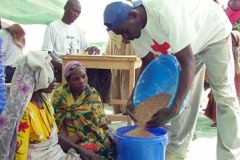UN considers international force for Chad
May 11, 2006 (N’DJAMENA) — The United Nations is looking to create an international force to help protect civilians and refugees in Chad from attacks by armed groups spilling over from Sudan’s Darfur region, a U.N. official said on Thursday.
 “We have a seriously deteriorating security situation in Chad and the government’s capacity is also diminishing in terms of security response,” Kingsley Amaning, humanitarian coordinator for the United Nations in Chad, told Reuters.
“We have a seriously deteriorating security situation in Chad and the government’s capacity is also diminishing in terms of security response,” Kingsley Amaning, humanitarian coordinator for the United Nations in Chad, told Reuters.
“Therefore along with the (Chadian) government we are looking at the possibility of putting in place an expatriate, international force that will support government efforts to provide security in the areas where we are operating.”
U.N. humanitarian chief Jan Egeland earlier met Chad’s President Idriss Deby to discuss the situation in the country’s long and porous border region with Darfur, where armed groups have been mounting cross-border raids on villages.
“It’s very clear that Chad has limitations with its present armed forces being small and its police force being even smaller, and that’s why … we are looking at other methods to try to protect the civilian, refugee and displaced populations,” Egeland told reporters.
U.N. officials gave no details which countries might provide soldiers for any mission or how large it would be.
Chad’s army has been stretched by rebel attacks culminating in an assault on the capital N’Djamena last month.
Deby accuses Sudan of backing the rebels and has warned that if the international community does not solve the Darfur crisis quickly and guarantee security along the border then his country would no longer be able to shelter Sudanese refugees.
Some 200,000 Sudanese have fled into Chad from Darfur, where pro-Khartoum Arab militias are battling other ethnic groups. The refugees have been joined this year by 50,000 Chadians displaced by fighting between their own government and rebels.
BUILDING ON PEACE DEAL
Khartoum and the main rebel faction in Darfur signed a peace deal last week in Abuja to end three years of fighting that has killed tens of thousands and forced 2 million into camps. Two other smaller rebel groups rejected the deal.
“I discussed with the president (Deby) how we can all now help to make the Abuja peace agreement a reality. The crisis in Chad has been fuelled by what has happened in Darfur and there will not be peace and security in Chad until we have peace and security in Darfur,” Egeland said.
“I urged the president to do what he can to get all of the rebel groups in Darfur to join the Abuja accord, and he promised to do what he can in this regard,” he added.
Attacks on humanitarian staff — carried out by gunmen believed to range from army defectors and rebels to common bandits — have intensified in Chad’s border region with Sudan.
A U.N. aid worker in the town of Abeche was shot last week by a man dressed in military fatigues who stole her jeep.
Around 70 staff from U.N. and other aid agencies, representing a quarter of the personnel in eastern Chad, pulled out in mid-April as security fears grew.
Amaning said Deby believed that the best solution was to secure Darfur but acknowledged that a U.N. force night not be in place before 2007. Sudan’s government opposes any U.N. peacekeeping mission in the troubled region.
(Reuters)
